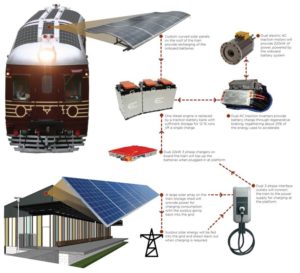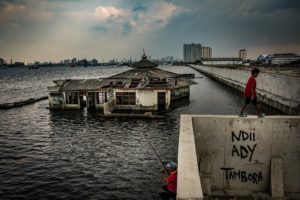Monday, December 25th, 2017
Christopher Ready, Reporter - futurism
 In a bid to establish itself as the new leader in protecting the environment after the U.S. reneged on the Paris Climate Agreement, France has just passed a new blanket ban on fracking and oil extraction that will enter into force in 2040.
In a bid to establish itself as the new leader in protecting the environment after the U.S. reneged on the Paris Climate Agreement, France has just passed a new blanket ban on fracking and oil extraction that will enter into force in 2040.
The proposal, drafted last September, was approved in Parliament by a show of hands on Dec. 19. After 2040, no new drilling permits will be issued and licenses will not be renewed, putting an end to the fossil fuels’ production in France and its overseas territories.
Monday, December 25th, 2017
Nick Lavars, - futurism

The solar train system
Credit: Byron Bay Rail
Those visiting the northern New South Wales coastline in Australia will have the chance to ride on new sustainably powered transport service. The Byron Bay Railroad Company is setting the wheels in motion for what it describes as the world’s first solar-powered train, whose roots can be traced back to World War II.
The two railcars used in the innovative rail service were originally constructed in 1949 to transport the massive influx of European immigrants arriving in the wake of WWII around the state of New South Wales. Handily, this meant that the train bodies were created with the same aluminum fuselage construction used for aircraft bombers, making them lighter than what we today consider “light rail”.
Those two cars sat unused in a yard from the mid-90s until 2013, when the Byron Bay Rail Company took on the task of restoring the heritage trains. The original plan was to power them with diesel, but the company says that the rapid, recent advances in solar technologies made going […]
Monday, December 25th, 2017
Nathan Heller, - The New Yorker

Credit: The New Yorker
Up the Estonian coast, a five-lane highway bends with the path of the sea, then breaks inland, leaving cars to follow a thin road toward the houses at the water’s edge. There is a gated community here, but it is not the usual kind. The gate is low—a picket fence—as if to prevent the dunes from riding up into the street. The entrance is blocked by a railroad-crossing arm, not so much to keep out strangers as to make sure they come with intent. Beyond the gate, there is a schoolhouse, and a few homes line a narrow drive. From Tallinn, Estonia’s capital, you arrive dazed: trees trace the highway, and the cars go fast, as if to get in front of something that no one can see.
Within this gated community lives a man, his family, and one vision of the future. Taavi Kotka, who spent four years as Estonia’s chief information officer, is one of the leading public faces of a […]
Monday, December 25th, 2017
VALERIE TARICO, - Raw Story

This is the image generally thought by scholars to be the most historically accurate image of Jesus.
Jesus has been described as the best known figure in history, and also the least known. If you mentioned the name “Jesus” and someone asked Jesus who?, you might blink. Or laugh. Even people who don’t think Jesus was God, mostly believe they know a fair bit about him. You might be surprised that some of your most basic assumptions about Jesus are probably wrong.
We have no record of anything that was written about Jesus by eyewitnesses or other contemporaries during the time he would have lived or for decades thereafter, and as best scientists can tell, all physical relics of his life are later fakes. Nonetheless, based on archeological digs and artifacts, ancient texts and art, linguistic patterns, and even forensic science, we know a good deal about the time and culture in which the New Testament is set. This evidence points to some startling conclusions about who Jesus likely was—and wasn’t.
- Cropped hair, not long. Jewish men at the time of Christ did […]
Sunday, December 24th, 2017
MICHAEL KIMMELMAN -- Photographs by JOSH HANER, - The New York Times

Jakarta
JAKARTA — Rasdiono remembers when the sea was a good distance from his doorstep, down a hill. Back then he opened the cramped, gaily painted bayside shack he named the Blessed Bodega, where he and his family sell catfish heads, spiced eggs and fried chicken.
It was strange, Rasdiono said. Year by year, the water crept closer. The hill gradually disappeared. Now the sea loomed high over the shop, just steps away, held back only by a leaky wall.
With climate change, the Java Sea is rising and weather here is becoming more extreme. Earlier this month another freakish storm briefly turned Jakarta’s streets into rivers and brought this vast area of nearly 30 million residents to a virtual halt.

Jakarta Is Sinking
10 miles
More than 2 inches per year
Less than 2 inches per year
JAVA SEA










